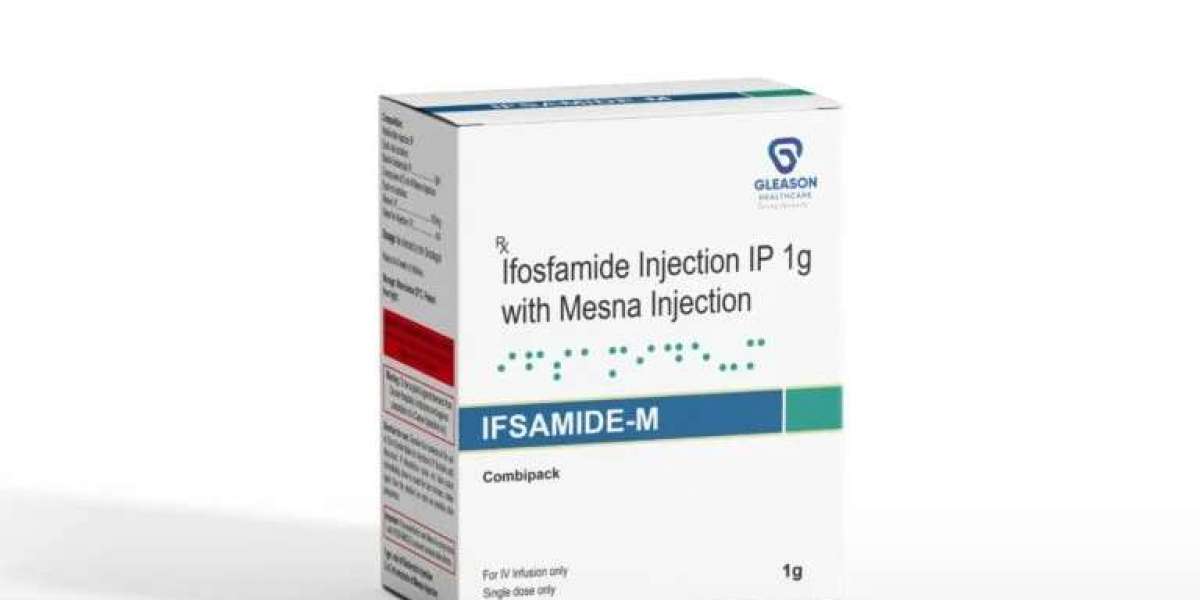This injectable medication plays a crucial role in cancer treatment by targeting and damaging cancer cells, thereby inhibiting their growth. This article explores the uses, benefits, administration guidelines, side effects, and precautions associated with Ifsamide-M Injection.
What is Ifsamide-M Injection?
Ifsamide-M Injection contains Ifosfamide and Mesna. Ifosfamide is a chemotherapy agent that belongs to a class of drugs known as alkylating agents. It works by interfering with the DNA inside cancer cells, preventing them from multiplying and spreading. Mesna is added to the formulation to protect the bladder from the harmful effects of Ifosfamide, reducing the risk of bladder toxicity and related side effects.
Uses of Ifsamide-M Injection
Ifsamide-M Injection is primarily used in the treatment of various types of cancers, including:
- Solid Tumors
It is commonly prescribed for treating cancers such as testicular cancer, ovarian cancer, and soft tissue sarcomas. Ifsamide-M helps shrink the tumor by attacking cancer cells. - Leukemia and Lymphoma
This injection is used in combination with other chemotherapy agents to treat different forms of leukemia and lymphoma, including Hodgkin’s lymphoma and non-Hodgkin’s lymphoma. - Cancer Treatment in Combination
Ifsamide-M is often administered as part of combination chemotherapy regimens. It works synergistically with other drugs to increase the effectiveness of the treatment.
Benefits of Ifsamide-M Injection
- Effective in Treating Cancers: By interfering with the DNA of cancer cells, Ifsamide-M is effective in controlling the growth and spread of cancer.
- Bladder Protection: The inclusion of Mesna helps reduce the risk of bladder toxicity, a common concern with Ifosfamide treatment.
- Improved Outcomes in Combination Therapy: When used in combination with other chemotherapy drugs, Ifsamide-M enhances the overall treatment effectiveness, especially in aggressive cancers.
How is Ifsamide-M Injection Administered?
Ifsamide-M Injection administered intravenously (IV) by a healthcare professional, typically in a hospital or clinic setting. The dosage and frequency depend on the specific cancer being treated, the patient’s overall health, and the response to treatment. It usually given over a period of several hours to ensure proper absorption and minimize side effects.
Dosage Guidelines
The dosage of Ifsamide-M Injection individualized based on the patient’s body surface area, cancer type, and prior treatments. Doctors will calculate the appropriate dosage to achieve maximum therapeutic benefits while minimizing side effects. It important to follow the prescribed schedule and attend all follow-up appointments for monitoring.
Possible Side Effects of Ifsamide-M Injection
Like all chemotherapy pills, Ifsamide-M Injection may cause side effects, although not everyone will experience them. Some common side effects include:
- Nausea and Vomiting
Chemotherapy often causes nausea and vomiting, though anti-nausea medications are commonly prescribed alongside it. - Fatigue
Many patients experience tiredness or fatigue, which may persist for some time after treatment. - Hair Loss
Hair loss is a known side effect of chemotherapy, but hair usually grows back once treatment ends. - Low Blood Cell Counts
Ifsamide-M can reduce the number of red blood cells, white blood cells, and platelets in the body, leading to anemia, increased infection risk, and bleeding problems. - Bladder Toxicity
Despite the inclusion of Mesna, Ifsamide-M can still cause bladder irritation or even hemorrhagic cystitis (bleeding in the bladder), though this is less common with protective measures in place. - Kidney and Liver Issues
Kidney and liver toxicity are possible, requiring regular monitoring of organ function during treatment.
Precautions and Warnings
- Hydration
It is important for patients receiving Ifsamide-M to stay well-hydrated to help protect the kidneys and bladder from potential toxicity. Adequate fluid intake and frequent urination are crucial. - Monitoring Organ Function
Regular blood tests, kidney function tests, and liver function tests are essential throughout treatment to detect any early signs of organ toxicity. - Pregnancy and Breastfeeding
Ifsamide-M not recommended during pregnancy or breastfeeding, as it harm the developing fetus or infant. Women of childbearing age should use effective contraception during treatment. - Infections and Immune System Suppression
Ifsamide-M can suppress the immune system, making patients more susceptible to infections. Patients should avoid exposure to infections and notify their healthcare provider if symptoms of infection, such as fever or chills, occur. - Other Medications
Patients should inform their healthcare provider of any other medications they are taking, as drug interactions may affect the effectiveness of Ifsamide-M or increase the risk of side effects.
Conclusion
Ifsamide-M Injection an important chemotherapy treatment used for various cancers, including solid tumors and blood cancers like leukemia and lymphoma. With its dual formulation of Ifosfamide and Mesna, it effectively targets cancer cells while minimizing certain side effects, such as bladder toxicity. However, like all chemotherapy drugs, it carries the risk of side effects that need to managed with the help of a healthcare provider. Temosure 250 Capsule particularly effective for certain types of brain tumors like glioblastoma multiforme and is often used in combination with other chemotherapy agents for enhanced treatment outcomes.







